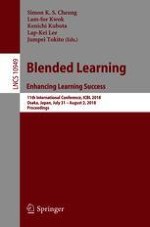2018 | OriginalPaper | Buchkapitel
A Meta-analysis of the Peer Evaluation Effects on Learning Achievements in Blended Learning Environment
verfasst von : Panpan Cui, Lanqin Zheng
Erschienen in: Blended Learning. Enhancing Learning Success
Aktivieren Sie unsere intelligente Suche, um passende Fachinhalte oder Patente zu finden.
Wählen Sie Textabschnitte aus um mit Künstlicher Intelligenz passenden Patente zu finden. powered by
Markieren Sie Textabschnitte, um KI-gestützt weitere passende Inhalte zu finden. powered by
